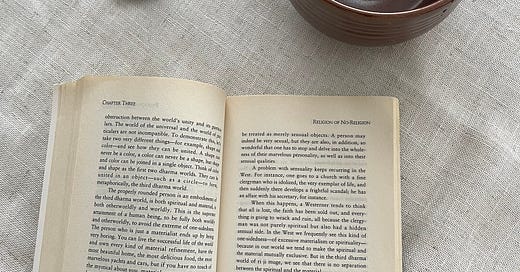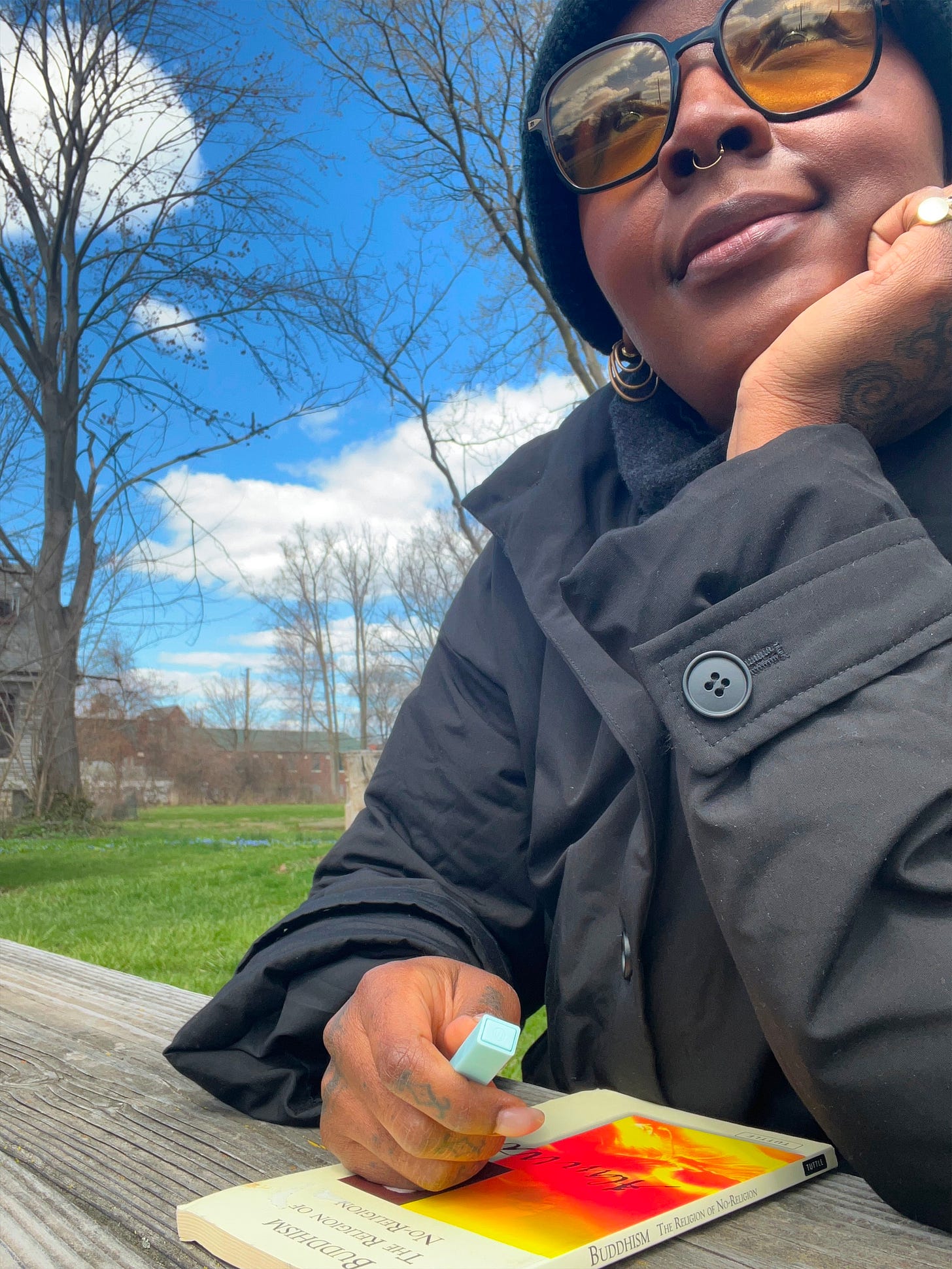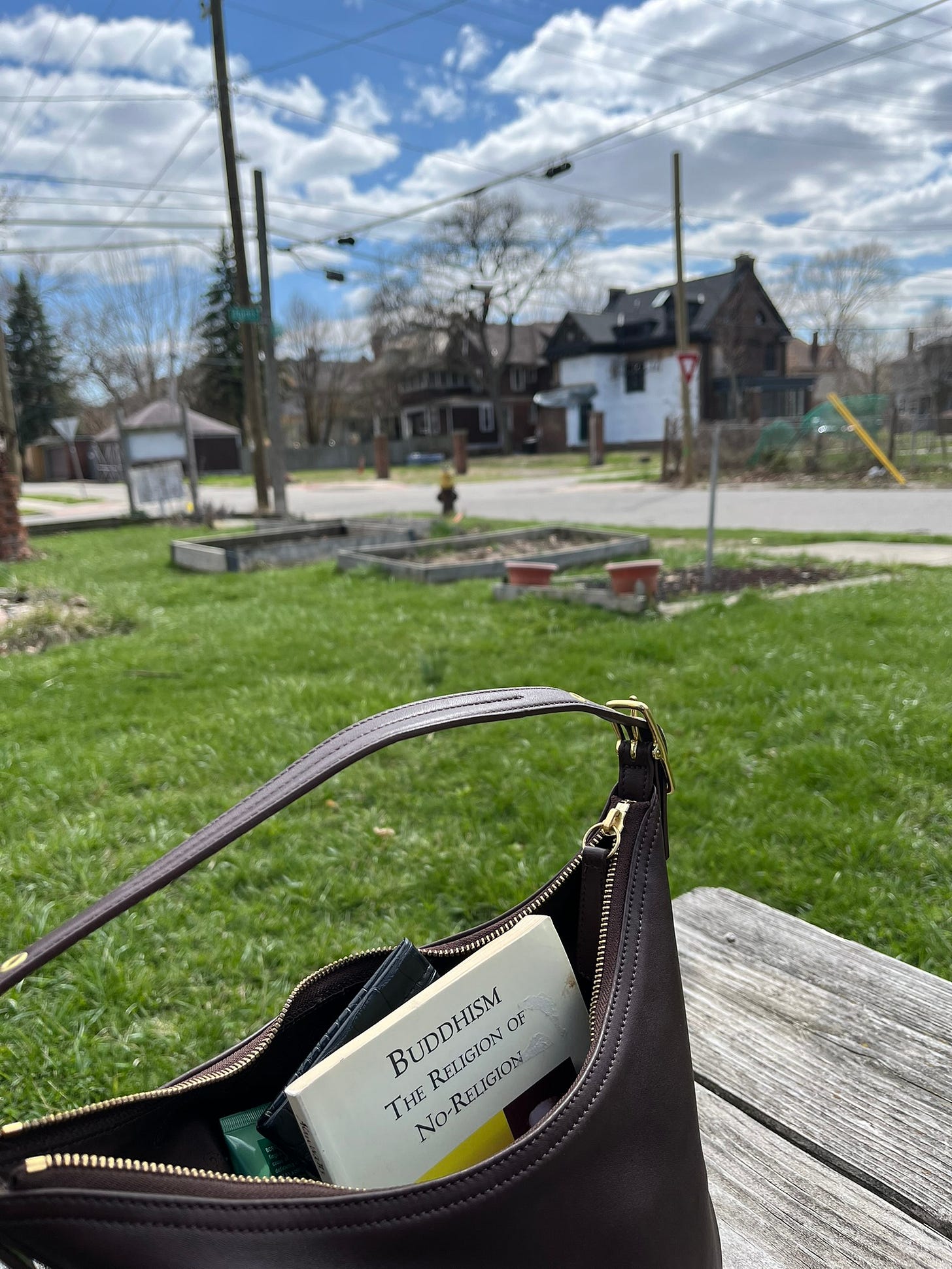Alan Watts’ Buddhism: The Religion of No Religion
Editorial Book Review: Our Longing for Belonging in a Binary Culture
Editor’s Note: This is not a traditional book review. It’s a reflection on an encounter, a deepening, and a book that arrived right on time. I had just finished reading Buddhism: The Religion of No Religion by Alan Watts when two men from the Jehovah’s Witness tradition came to my door. Our conversation stirred a myriad of feelings within me that I didn’t have the language for—until I realized this book wasn’t just something I had read but something I was living through. This was my way in to this book review. Part editorial, part quote constellation, and part quiet prayer for what it means to seek God beyond the gated—outside of boundaries and names.
Included:
My Story & Review
A Constellation of Quotes
Who This Book Is For
How This Book Helped Me See Differently
Where to Find This Book
My Story & Review
It began with a knock at the door. Two older gentlemen stood kindly on my porch, flyers in hand, eager to share the good news. They were from the Jehovah’s Witness tradition—bright-eyed, sincere, and certain. We stood there, conversing about God, truth, and scripture.
I had just finished Alan Watts’ Buddhism: The Religion of No Religion, a book that distills the heart of Buddhist philosophy into something like an exhale—sharp, spacious, and relaxing. One line in particular kept ringing in my ears as the two men shared verse after verse with conviction:
“This is the situation of everyone who feels that life is a problem to be solved…I feel trapped by this world, and so I want to get the better of it. That is what everybody is looking for in a teacher: a savior who can show you how to cope with life.”
-Alan Watts
Watts captured something I’ve long sensed but struggled to name—the way many of us, in approaching religion, are secretly trying to outsmart God. To find a trick. A bypass. A solution to the unbearable weight of being. Being human, being God, being here on Earth. The desire isn’t always for salvation though, but for a kind of mastery that makes us feel equipped enough for the calling we have received.
And so when I tried to speak not from mastery but from mystery—from curiosity, from the poetry of our shared God-ness rather than the prose of doctrine—I felt a quiet wall rise between us, not out of malice, but out of differing frameworks. I was speaking in the language of rivers; they were speaking in the language of rules. I quoted Christ as consciousness, the devil as archetype, and Jesus’ fulfillment of law as a cosmic act of wholeness. They returned steadfast, to scripture—chapter and verse, black and white.
I left that conversation moved, nourished but also unsettled and quietly aching. Not because I disagreed with them but because the common ground we could have explored together wasn’t perceived by all. No shared soil beneath the roots of our faiths. And what I longed for was openness— a place to meet one another.
It’s not lost on me that reading this book prepared me for this experience, and Watts would have likely smiled at the play of it all. His entire book—really, his entire life—was a dance across spiritual boundaries. Buddhism: The Religion of No Religion is less a theological treatise and more a lineage of liberation. He showed how the moment we fixate on belief, we risk severing ourselves from the mystery. That God cannot be captured by any one name. That the truth isn’t in the answer—it’s in the root of the question.
This doesn’t mean nothing matters. Or that everything is an illusion. On the contrary, it means everything is alive. Every faith tradition is a cry, a hymn, a hunger to know and be known by the divine.
Where my neighbors saw the multiplicity of religions as the Tower of Babel—a scattering—I saw it as a map of rivers all moving toward the same sea. Each with different minerals, currents, and clarity—but each still water. Still drawn from the main Source.
The greatest point of tension between us was sin. They traced it to Adam and Eve, describing it as an inheritance too powerful to resist. I couldn’t accept this. Not because I don’t see brokenness in our world, but because I refuse to believe that sin is more powerful than the perfection that made us.
Watts isn’t writing to erase religion but to dislodge us from its cages. He invites us to stop trying to win against life. To stop treating our humanness as a flaw to be corrected. He offers a vision not of control, but of surrender—to chaos, to the eternal.
This book is not for those who want instructions. It is for those who want to seek God beyond the gated—outside of boundaries and names. For those who want to feel the divine in all things, not only in the church. It’s not anti-Christian. It’s not even fully Buddhist. It is, like all great spiritual works, a mirror. A gentle undoing. A dare to belong to the mystery again.
And that’s where I’ll meet my neighbors next time—because life doesn’t need any more persuasive answers or zealot desires for agreement but for humans willing to find each other, with open hands, minds & hearts.
A Constellation of Quotes
A selection of quotes, five that jumped off the page, paired with my reflections on each. Honestly, I wish I could quote the whole book!
Quote 1
“There is no sign about the spiritually advanced to indicate that they are self-consciously religious… The true bodhisattva does not leave a track of any kind, either by being overtly religious or by being overtly non-religious.”
-WattsEven simplicity can become performance. This quote reminded me that true spiritual depth isn’t in appearances alone—whether ornate or austere—but in the unseen intention that can be felt. Sometimes, even the way we distance ourselves from tradition can become its own badge of honor. This made me think more honestly about my own unattachment & approach to the realm of religion and spirituality.
Quote 2
“This explains why Buddhism… is not frantically concerned with being good. It is concerned with being wise… with having tremendous sympathy and understanding and respect for all the ignorant people who do not know that they’re it.”
- WattsThis called me to examine how often religious paths are confused with moral superiority. I think true wisdom includes compassion, not separation. Many of us have been conditioned to believe that goodness is about behavior—but goodness is deeper, quieter. It allows us to see others without superiority, to honor the complexity of someone else’s journey without assuming we would’ve automatically done better in their place. It reminded me how easy it is to “other” people in the name of “doing good for God.”
Quote 3
“Saint Augustine said, God did not give us commandments in order that we should obey them, but rather to prove that we could not. The law, in other words, was a gimmick, an upaya” (Upaya means the teacher’s method of arousing enlightenment in the student)
-WattsThis helped me reimagine the law as an invitation, not a punishment—a loving structure to turn us toward light, not a test of our worth. Spiritual laws aren’t rules meant to shame us, and this affirmed my theory around the function of religion: more like training wheels, designed to help us remember our original balance. It’s not about following a strict doctrine—it’s about learning to move with grace until it becomes a natural part of life.
Quote 4
“Whether we take the right-hand path or the other, we all arrive at the same destination. There are certain kinds of people who… do not know that they exist unless they hurt, and therefore the painful path is the right way for them. We should not condemn them or the path.”
-WattsThis just deepened the truth for me that everyone’s journey is different and that pain is not always something to be avoided—it can be a doorway. While I personally don’t believe that suffering is necessary for my life, I acknowledge that some souls need intensity to awaken, while others move through life more gently. Instead of condemning the path someone else is on, this quote reminded me to trust the slow unfolding of each person’s becoming. God leaves no one behind, and all paths, even painful ones, are valid. We will all arrive at the same destination in due time.
Quote 5
“It is in the nature of duality that self and other go together. You do not need to cling to yourself and oppose the other. Everything you call the other is you too.”
-WattsThis feels like the heart of it all. If I had to distill my belief in interfaith fellowship into one sentence, it might be this one. Anytime we use religion to separate rather than to see, we’ve already missed the point. I think about how often we protect ourselves from seeing God in unfamiliar forms out of fear and how the more we hold in reverence the nature of duality, the delight of beauty beyond binaries, the impulse to reject one another gently disappears.
Who This Book Is For
This book is for any seeker who has sat in church pews and temple courtyards and still felt like something was missing.
It’s for anyone who suspects that God might not live in one book alone.
It’s for anyone drawn to the edges of spiritual thought, curious about Alan Watts’ work, or thinking about things beyond binaries.
It’s for new seekers and seasoned ones alike—anyone willing to ask, “What if everything I know about God is just the beginning?”
How This Book Helped Me See Differently
It didn’t give me answers. It helped me slow down.
It reminded me that interfaith dialogue isn’t about persuasion—it’s about presence.
That sin is not stronger than the perfection seeded in us.
That everyone will arrive, even if they take an alternative way.
That meditation is not optional—it’s the most natural way we listen without words.
And maybe most of all, it reminded me that the root of every tradition, beneath the doctrine and dogma, is love.
It affirmed in me that we weren’t made to reject the material or spiritual, but to embody both with awe and devotion. I’ve seen what happens when I cut myself off from either: a flatness, a dryness, a disconnection from life. But when I see everything—yachts and incense, food and prayer—as part of the same great belonging, I live differently.
This book reads like a long, thoughtful conversation. It was originally a live lecture and later transcribed; you can feel that intimacy woven within each page.
There are dates and historical notes if you’re new to Buddhism and enough texture for those more seasoned on the path.
I can tell I’ll be referencing this book often because when Watts spoke of interdependence as the final evolution, it felt like a remembering. Not a goal to strive toward but a deep truth that I’m allowing to reveal itself in my life. I think I’m slowly building something—some mosaic of interfaith fellowship, where streams remember they come from the same sea. We weren’t meant to merge everything into sameness but to honor the function, the necessity, and the sacred dance of difference. Yes, unity exists, but maybe we’ll get there through the winding roads of infinite diversity.
Where to Find This Book
If you read this one, please share some of your favorite quotes & takeaways. I purchased my copy from here, I appreciate Abe Books’ curation. Another favorite option is Thrift Books. Or support your local bookstore or library.
Let me know what you’re currently reading, I’d love to know.
With gratitude & grace,
Jasmine
Up Next
Resonated with this piece? You might enjoy these next:
Erah Society
A modern space for seekers & founders.
Reimagining business, spirituality, and cultural well-being.
/ About this Substack
/ Instagram
/ Visit Our Website
/ Listen to the Podcast











Loved reading every bit of this. So beautifully shared as always and looking forward to reading this book. Every quote felt like home 💗
This piece is so refreshing!
Thank you for your words. And for the book recommendation.